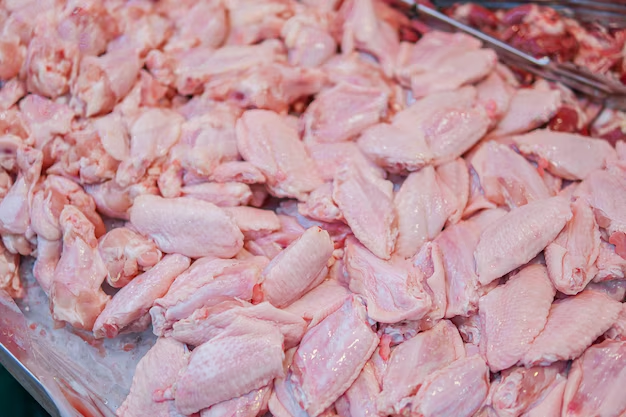How Long Can You Safely Store Uncooked Chicken in the Refrigerator?
When it comes to food safety, particularly with chicken, there's an understandable concern about how long uncooked chicken can remain in the refrigerator before it becomes unsuitable for cooking and consumption. Chicken is a staple in many households due to its versatility and nutritional value. However, if not stored properly, it can become a breeding ground for harmful bacteria. Let's dive into best practices for storing uncooked chicken and extend our understanding with related subtopics to ensure your meals are both delicious and safe.
The Basics of Refrigerating Uncooked Chicken
The refrigerator is a crucial tool for preserving the freshness and safety of uncooked chicken. Generally, uncooked chicken can be stored in the refrigerator for up to 1-2 days. This timeframe helps ensure that the chicken remains safe to eat and does not become a health hazard.
Factors Affecting Refrigerator Shelf Life
Temperature: The ideal refrigerator temperature is at or below 40°F (4°C). This temperature slows the growth of bacteria, keeping your chicken fresh longer. Frequent temperature checks can ensure your fridge maintains this safe range.
Storage Method: Proper storage is essential. Keep chicken in its original packaging if unopened or transfer it to an airtight container if you've already opened it. This minimizes exposure to air and prevents contamination from other foods.
Cross-Contamination Protection: Ensure that your chicken is stored on a lower shelf to prevent any juices from dripping onto other foods, reducing the risk of cross-contamination. It's especially important because raw chicken can contain harmful bacteria like Salmonella.
Understanding Chicken Expiry and Spoilage
Recognizing signs of spoilage helps avoid foodborne illnesses. Look for these key indicators:
- Odor: Fresh chicken typically has a mild scent. A sour, ammonia-like smell signals spoilage.
- Color: Fresh chicken is usually pink. A grayish hue or yellow patches are signs it might be past its prime.
- Texture: Chicken should be moist, but not sticky or slimy.
Safe Handling Practices
Handling chicken with care reduces health risks. Here are some safe handling tips:
- Wash Hands and Surfaces: Always wash your hands with soap and water before and after handling raw chicken. Disinfect kitchen surfaces that have come into contact with raw chicken.
- Use Separate Utensils: Dedicate separate cutting boards and knives for raw meats to prevent the spread of bacteria to other foods.
Freezing Chicken: An Extended Option
If you're not planning to cook the chicken within 1-2 days, freezing is an excellent way to extend its shelf life. Freezing chicken can preserve it for up to 9 months. When you decide to freeze, consider these tips:
- Portion Before Freezing: If you buy chicken in bulk, portion it into meal-sized packages. This reduces waste and makes defrosting easier.
- Label with Date: Always label packages with the current date to track freshness.
Defrosting Safely
When you're ready to use your frozen chicken, defrost it safely to maintain its quality:
- Refrigerator Method: Plan ahead and move chicken from the freezer to the fridge 24 hours before cooking. It's the safest thawing method.
- Cold Water Method: Submerge chicken in cold water, changing water every 30 minutes. Ensure the chicken is in a leak-proof bag to prevent contamination.
The Cost of Negligence: Understanding Risks
Storing chicken improperly can lead to health risks such as foodborne illnesses. Symptoms like stomach pain, diarrhea, and fever may occur if spoiled chicken is consumed. Following these guidelines ensures you avoid unnecessary health risks and maintain food safety in your home.
Practical Tips for Managing Chicken Storage 📝
Here's a handy summary of practical chicken storage tips:
- 🕒 Refrigerate quickly: Store uncooked chicken in the fridge within 2 hours of purchase.
- 📏 Maintain temperature: Keep your fridge at or below 40°F (4°C).
- ✅ Check expiry: Pay attention to the 'sell-by' or 'use-by' dates.
- 🧽 Clean handling: Always wash hands and utensils after handling raw chicken.
- ❄️ Freeze wisely: For long-term storage, freeze chicken and label with the date.
Debunking Common Myths About Chicken Storage
Myth 1: Washing Chicken Before Cooking is Necessary
Contrary to popular belief, washing raw chicken is not recommended. It can spread bacteria to kitchen surfaces. Proper cooking kills bacteria effectively.
Myth 2: Expired Chicken is Always Unsafe
Sometimes, chicken can still be safe shortly after the 'sell-by' date if stored correctly. Use sensory indicators (smell, color, texture) to judge its quality.
Myth 3: Thawing Chicken at Room Temperature is Fine
Room temperature encourages bacterial growth. Always use the refrigerator or cold water methods for thawing.
Beyond Chicken: General Food Storage Tips
While our focus is on chicken, these storage guidelines can be considered for other meats and perishable items:
- Use Freshness Indicators: Check for odor, color, and texture.
- Proper Organization: Storing meat on the lowest shelf prevents drips and contamination.
- Optimized Packaging: Airtight containers and vacuum-sealing can preserve the freshness of meats longer.
A Sustainable Approach to Food Storage
Minimizing waste is an essential aspect of responsible food storage. By planning meals and careful portioning, you save money, reduce waste, and make a positive impact on the environment.
Using Leftovers Efficiently
Transform leftovers into new dishes. Cooked chicken leftovers should be used within 3-4 days. Get creative with salads, soups, or sandwiches.
Final Thoughts: Empowering Your Food Safety Practices
Incorporating these chicken storage tips empowers you to maintain both safety and quality in your meal preparation. With careful handling and mindful storage, you prevent foodborne illnesses and extend the usability of your kitchen staples. Remember, a well-organized kitchen not only saves time but also promotes your and your family's health.
By taking a proactive approach, you're not just storing food—you're ensuring that each meal is nutritious and safe, greatly enhancing your cooking experience. Now that you know how to store uncooked chicken effectively, go ahead and plan your meals with confidence, knowing that you’re prepared to enjoy safe and delicious dishes anytime.

